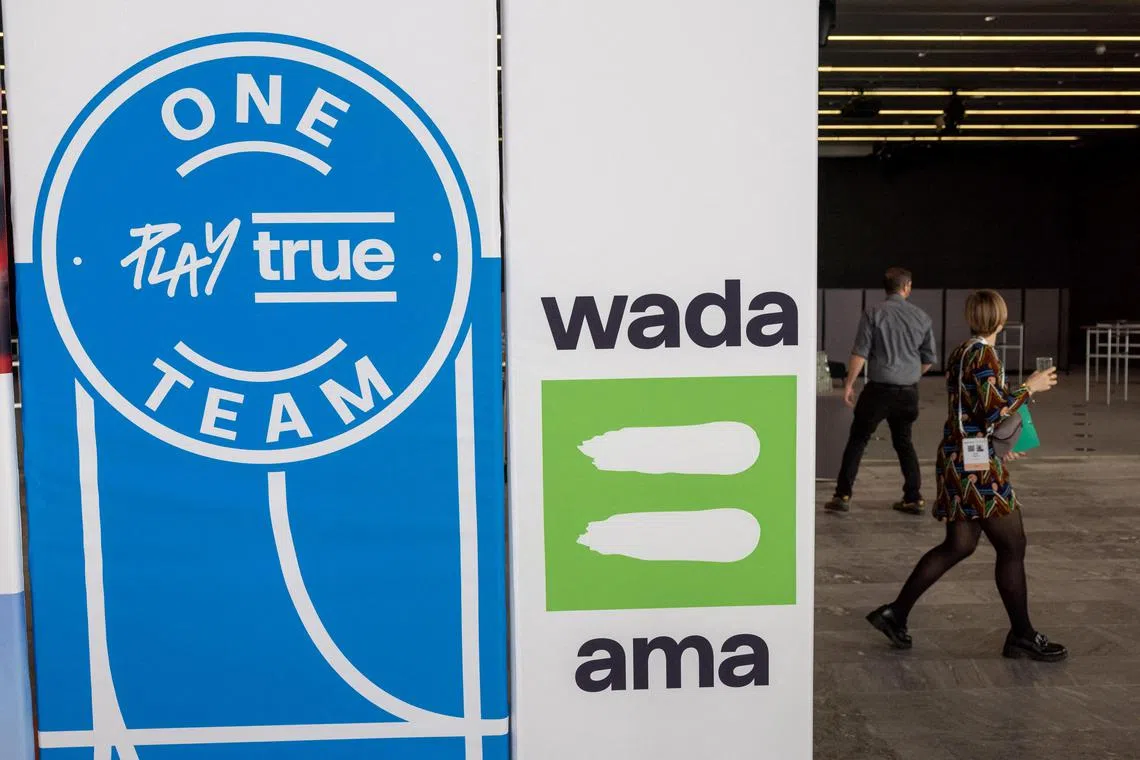Wada did not mishandle Chinese doping case, says investigator
Sign up now: Get the biggest sports news in your inbox

The World Anti-Doping Agency has vigorously defended its handling of the Chinese swimmers case, and welcomed the investigator's report, which vindicates its process.
PHOTO: REUTERS
LAUSANNE – The World Anti-Doping Agency (Wada) did not mishandle or show favouritism in the doping case involving Chinese swimmers who were cleared to compete at the Tokyo Olympics, an independent investigation said on July 9.
A report by Swiss prosecutor and lead investigator Eric Cottier found there was nothing in the file to suggest Wada in any way favoured the 23 swimmers who tested positive
The swimmers were cleared by a Chinese investigation, which said they were inadvertently exposed to the drug through contamination. The report determined the swimmers were staying at a hotel where traces of TMZ were discovered in the kitchen.
But in an annex to his report, the prosecutor noted that two top scientists at Wada said they had difficulty believing China’s claim that the swimmers had been unwittingly contaminated.
Wada said it had no evidence to challenge China’s findings and that external counsel had advised against appealing them.
Cottier’s investigation reached a similar conclusion, finding no irregularities on the part of Wada’s review of the China Anti-Doping Agency (Chinada) decision and that it had covered all relevant issues in determining whether to appeal to the Court of Arbitration for Sport.
“All the elements taken into consideration by Wada, whether they come from the file produced by Chinada with its decision or from the investigation procedures that it carried out, show the decision not to appeal to be reasonable, both from the point of view of the facts and the applicable rules,” wrote Cottier in his report.
Wada has vigorously defended its handling of the Chinese case and welcomed the report, which vindicates its process.
A more complete report is expected in the coming weeks and could include recommendations, but Wada president Witold Banka emphasised it will not change any of the findings in the initial summary.
“The independent prosecutor has concluded Wada showed no bias towards China and the decision not to appeal the Chinese swimming cases was undisputedly reasonable based on the evidence,” Banka said. “His conclusion is very crystal clear.
“We were disgustingly accused of wrongdoing by a few individuals that there was a cover-up and that is why we found it very important to engage the independent prosecutor.”
Wada critics
The findings, however, are unlikely to satisfy Wada critics, with Travis Tygart, head of the United States Anti-Doping Agency (Usada), saying in a statement that “most of the critical questions” surrounding the case remained unanswered.
“This is unsurprising since Wada itself handpicked the investigator and set the extremely limited scope of the investigation, preventing a meaningful review,” he added.
Tygart had taken a pre-emptive shot on July 8 at the yet-to-be-published report, calling the investigation “more of a self-serving check-the-box type of exercise”.
In a video message to American athletes, he said if the Cottier report does not provide answers then a US-backed investigation will, and called for those found responsible to be held accountable.
A US House of Representatives committee in May asked the Department of Justice to launch inquiries into the Chinese doping case ahead of the Paris Olympics.
Anti-doping groups FairSport and Global Athlete said the report did not provide sufficient evidence to back up its findings and said the investigation was “inherently flawed from the outset due to its limited scope and independence”.
Wada confirmed last week it was aware the matter was being investigated by US law enforcement but that the report makes clear it did nothing wrong and accused Usada of playing games.
“From the very beginning what I said is, this is the clear political game from the few individuals from the US to destabilise the system and maybe to take control,” said Banka.
“We treat all our stakeholders equal, no matter from which country they come from. We have to be based on the rules of law and not conspiracy theories.”
He added: “We cannot accuse anyone of wrongdoing when you have no evidence, it would be the end of the anti-doping system.”
“We have nothing to hide and did a good job. Why one country wants to take control of the anti-doping system is completely unfair and is against the harmonisation of the system and very dangerous for the sporting world.”
Eleven of the 23 swimmers who tested positive are in the Chinese team set to compete in the July 26-Aug 11 Paris Games. Several are once again favourites to win medals.
Meanwhile, Australian athletes will be free to speak out about the doping case, as long as they do not do it on the playing field or medal podium, chef de mission Anna Meares said on July 10.
“If they have an opinion or when they want to share it, they’re welcome to, the athlete voice is really, really important,” she said.
“There are lots of places where they can do that... but the two places that athletes agreed upon that protest and voice wouldn’t be used, was on the podium and on the field of play.” REUTERS, AFP, NYTIMES


